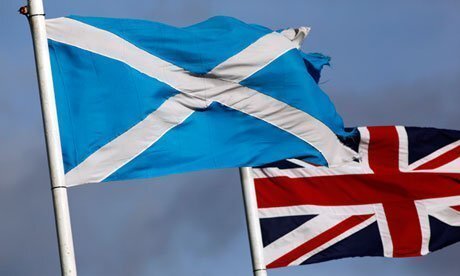
By Allan Wall
09/17/2014
On September 18th, voters in Scotland are scheduled to go to the polls and vote in a very straightforward referendum. Unlike the confusing referendum held in Puerto Rico in 2012 (see here), the Scotland referendum poses a very simple question to voters.
The question on the ballot is simply “Should Scotland be an independent country?”. There are only two choices for the voter — Yes or No.
The question is simple, but the details are complicated. If Scotland were to leave the UK, many issues would have to be negotiated — the North Sea oil money, the UK national debt and Scotland’s part of it, the currency. Then there are the UK military installations, which include RAF bases and a Royal Navy installation where submarines with nuclear weapons are based.
What about NATO and the European Union?
Would an independent Scotland have a monarch? If so, would Scots continue with Queen Elizabeth II or get a new monarch, maybe another member of the Royal family such as Prince Harry?
As for what remains of the United Kingdom, would the UK have to change its official name again?
Consider the history of the union. In 1603, England’s Queen Elizabeth I died, leaving no heir. So James VI of Scotland, a kinsman of Elisabeth and fellow descendent of Henry VII, was asked by the English Parliament if he’d like to also be king of England. Of course James said yes, and moved south to London.
This was the King James of the King James Bible, published in 1611 and still the most-read Bible translation in the United States. Also, James was the monarch for whom the Jamestown colony in Virginia was named. Jamestown, founded in 1607, was the beginning of what developed into the United States of America.
England and Scotland continued with separate parliaments until 1707 when the two kingdoms who were sharing a monarch formally united into a political union called “The Kingdom of Great Britain”.
In 1801, it became the United Kingdom of Great Britain and Ireland.
In 1927, after the formation of the Irish Free State, the name was changed to the United Kingdom of Great Britain and Northern Ireland.
So if Scotland secedes from the UK, would the name be changed, and if so, to what? “The United Kingdom of Great Britain Minus Scotland”? Or how about “The United Kingdom of England, Wales and Northern Ireland”?
Even now, Scotland has its own legal system, distinct from the English Common Law system. Scots Law includes three verdicts in criminal law: guilty, not guilty and not proven.
During the time of the union, Scots made significant contributions to the British Empire, and to the scientific, technological, agricultural and literary accomplishments of Britain.
Most of my forebears were English, However, I do have some Scottish ancestry. Dr. Robert White,my great-great-great-great-great grandfather, was educated at the University of Edinburgh, served as a surgeon in the Royal Navy, and settled in Virginia back in colonial days. My forebear Dr. White was prominent enough to have his own Wikipedia page, here it is.
I´m personally not taking a position on the September 18th Scottish referendum, though I’m certainly interested to see how it turns out and what follows.
To me, what’s more important than the exact political divisions of the British Isles is that the archipelago’s traditional ethnicities survive and thrive. Currently, the British Isles are in great danger from multiculturalism, mass immigration, home-grown jihadism and leaders who don’t defend their own people. Sound familiar?
Would the independence of Scotland help or hinder the survival of the historic Scottish nation? I don’t know, that’s a tough call to make. Maybe (sigh) the traditional peoples of the British Isles are doomed either way, or maybe (hopefully) new developments and new leadership will improve their situation.
This is a content archive of VDARE.com, which Letitia James forced off of the Internet using lawfare.